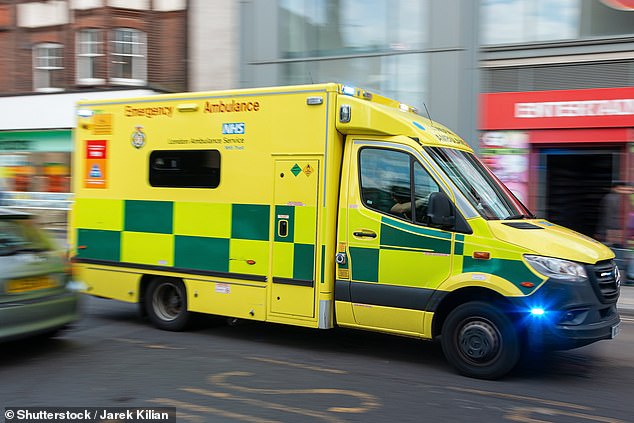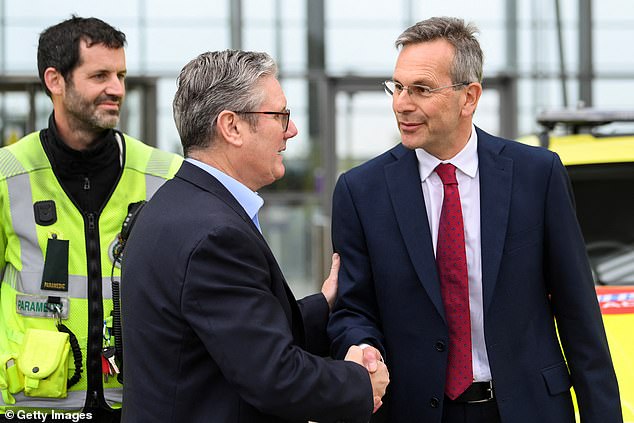Ambulance services have been hit with bills totalling £27.5million to transport increasing numbers of obese patients.
Bosses have been forced to splash out on specialist ambulances and lifting equipment or pay private providers to carry people who are too large for standard vehicles.
Health leaders last night urged the government to do more to tackle the nation’s obesity crisis, while campaigners warned the NHS ‘cannot cope’ with the burden placed on it by individuals with ‘grossly unhealthy lifestyles’.
North West Ambulance Service has paid almost £15million in the past five years for ambulances to carry the overweight, Freedom of Information responses show.
It hopes to cut its annual payment of £2.715million to private operators by buying eight new vehicles this year for £416,976.
And London Ambulance Service is investing £1million for its own fleet, having paid contractors £1.6million a year for five years.
South Central Ambulance Service – which covers Berkshire, Buckinghamshire, Oxfordshire and most of Hampshire – said it had spent £2.3million over the past five and a half years.
East of England Ambulance Trust has got through more than £1.25million in two years.

Ambulances took an average of 29 minutes and 37 seconds last month to respond to emergency calls such as heart attacks, strokes and sepsis
North East Ambulance Service said it has not spent any money on new transport for bariatric patients but all its ambulances ‘include an extra wide tail lift with the lifting capacity of 500kg or 78 stone to allow bariatric patients to be transported’.
John O’Connell, chief executive of the TaxPayers’ Alliance, said: ‘Taxpayers will be horrified to see the burden placed on NHS budgets by some irresponsible patients.
‘The health service simply cannot cope with the weight placed on it by those individuals with grossly unhealthy lifestyles.
‘Ministers need to start seriously considering how to ensure that patients cough up when their own choices end up impacting taxpayers.’
Rory Deighton, acute director at the NHS Confederation, which represents healthcare organisations, said: ‘These examples of NHS spending on bariatric ambulances highlights the reality of the increasing costs of an ageing and increasingly unfit population.
‘NHS leaders will be looking to the government to tackle some of the root causes of obesity as part of its wider mission to improve the health of the nation. Being bold and legislating on contentious issues like food policy will help deliver the Secretary of State’s ambition to spend less on treatment by focusing more on prevention.’
Recent Government research shows nearly two-thirds of UK adults are overweight or obese.
Being overweight increases the risk of heart disease, cancer, type 2 diabetes and muscular-skeletal issues.

Recent Government research shows nearly two-thirds of UK adults are overweight or obese
Daniel Elkeles, chief executive of NHS Providers, which represents NHS trusts, said: ‘The NHS is there for everyone who needs it.
‘Providing care for the most obese patients require specialist skills, equipment and ambulances
‘It is right for trusts to make that investment.’
The average response time in June for ambulances dealing with the most urgent incidents, defined as calls from people with life-threatening illnesses or injuries, was seven minutes and 55 seconds.
This is up slightly from seven minutes and 50 seconds in May and is above the target standard response time of seven minutes.
Ambulances took an average of 29 minutes and 37 seconds last month to respond to emergency calls such as heart attacks, strokes and sepsis.
This is up from 27 minutes and 48 seconds in May.
The Government and NHS England have set a new target for this figure to average 30 minutes across 2025/26.

Daniel Elkeles, chief executive of NHS Providers (right), with Prime Minister Sir Keir Starmer
Response times for urgent calls, such as late stages of labour, non-severe burns and diabetes, averaged one hour, 44 minutes and 56 seconds in June, up from one hour, 34 minutes and 51 seconds in May.